In 1971 a man named Merle Robbins had an argument with his son about the rules for Crazy 8s. In a flash of inspiration he wrote his own set of rules for a new game and dubbed it “UNO”. In UNO players attempt to empty their hand of cards by playing them to a shared discard pile. This new game contained cards of 4 different colors numbered 1-9, Wild cards, Skips, Reverses, Draw 2 cards, and the infamous and iconic Draw 4 card. When a player has a single remaining card in their hand they must announce “UNO” to the table to make sure everyone knows they might be able to go out…effectively painting a target on their back.
After raising the $8,000 needed to print 5,000 UNO decks and selling them out of his barber shop, Robbins sold the rights to UNO to International Games for $50,000 plus ongoing royalties. After nearly 50 years, and over 150 million copies sold, UNO is still the undisputed king of custom card games. Love it or hate it, UNO’s success isn’t an accident; it features simple gameplay, colorful artwork and graphic design, and a level of strategy that leaves room for players to chat with friends and family while playing the game.
Even though UNO dominates the card game market there’s still loads of other options. In this Top 6 piece, I’m going to present 6 light card games that I think could replace UNO on your family’s game table.
PUSH
At the top of the list is a game that I think could easily unseat UNO as the king of light card games. In PUSH, players “push” their luck in trying to collect more points from a shared deck of cards than their opponents.
On your turn you’ll flip over the top card from the deck, placing it into one of 3 piles of cards. Each pile can only contain one card of each number (1 through 6) and one card of each color (red, blue, purple, yellow, and green). As long as you have a valid spot to place the card you’re safe, but if you can’t put the card into one of the three stacks, you bust and your turn is over. At any point before you bust you can choose to stop and take all of the cards in a single stack and place them into your Bench. Then in clockwise order the next player gets to choose one of the remaining stacks until all stacks have been taken. All of this still happens if you bust; you just lose the chance to select a stack, potentially giving lots of points to your rivals.
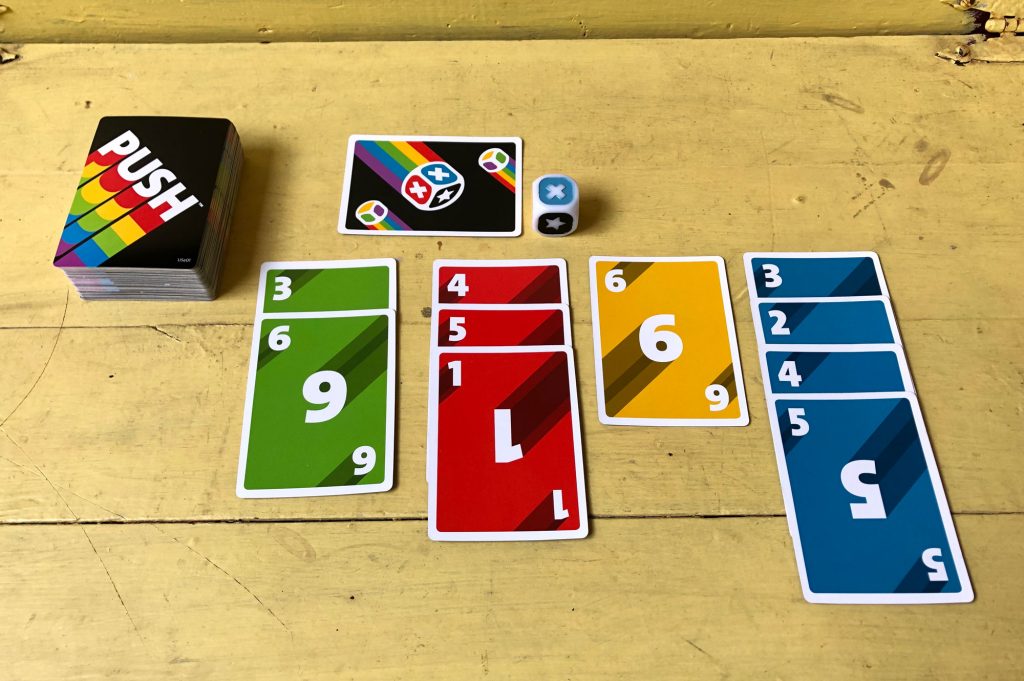
One thing to remember is that cards currently in your Bench are still vulnerable until they’ve been Banked. Mixed in with the point cards are a number of Roll cards. When selecting your stack, if it contains a Roll card you must roll the included 6-sided die and take your chances. If it comes up black, you’re safe, but if it displays one of the 5 colored faces then you must discard all cards of that color from your Bench. On their turn players can always pass to Bank all cards of a single color, making them permanently safe.
PUSH is easily one of my favorite games of 2019, and I’ve happily taught it to dozens of people at game nights I’ve attended. It’s one of the few games that I don’t bother teaching the rules first…I simply start dealing the cards and explain as I go. It’s easy to play, and even though the rules seem simple, the choices you have to make aren’t easy. In many cases you’re forced to choose between two good options, or even worse between two bad options. Try it and you might just PUSH UNO back into the closet for good.
Five Crowns
Five Crowns is one of the few mass market games you’ll ever hear me recommend, but it deserves it. Five Crowns is a rummy style game with 5 distinct suits: (hearts, spades, clubs, diamonds, and stars), played over 13 hands. For each hand, the card that matches the number of cards dealt in the hand is wild. In the first round players are dealt 3 cards (with the 3 card being wild), all the way up until the 11th round where players receive 13 cards (with the king card being wild). This leads to the game’s tagline: “It’s not over until the kings go wild”.
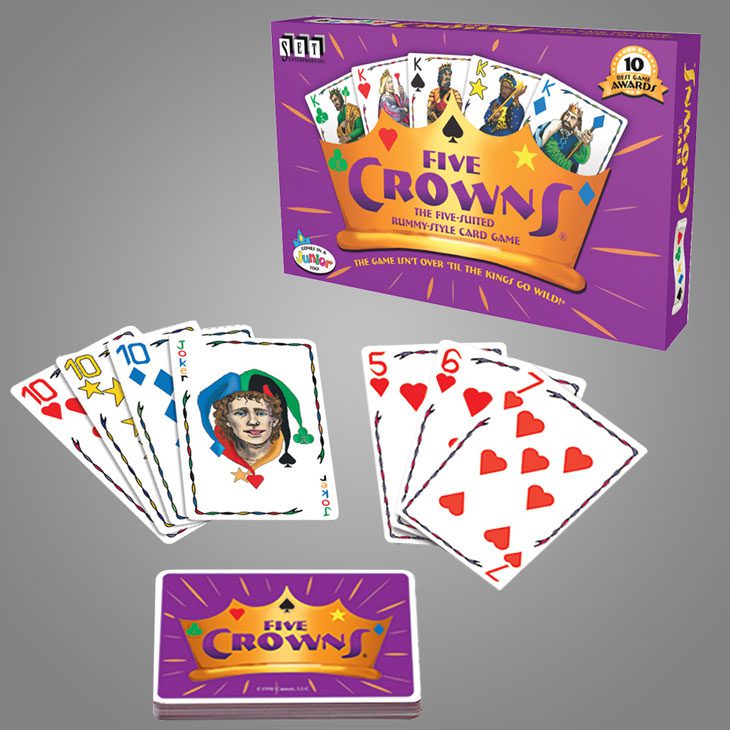
On your turn you must draw from either the top of the deck or the discard pile, then discard one card from your hand. In between drawing and discarding players can lay down sets (Five Crowns calls this a book, and it consists of cards all of one number: 8❤️ 8? 8⭐️ ), and runs (cards all of the same color in an unbroken sequence 3? 4? 5?). The round is over when someone has laid down all of their cards and discarded their remaining card from their hand. The other players tally up the points remaining in their hand, and a new round is started. After all rounds are played the winner is the player with the least points.
I was skeptical of this game when I first heard of it…but I’m delighted to have been introduced to Five Crowns. It’s been a favorite of my wife’s family for many years, and will likely remain in heavy rotation for years to come. My mother in law is superhumanly good at this game; so much so that barely a game of Five Crowns goes by where I don’t accuse her of witchcraft at least once. It has a bit more meat than UNO, but it’s got many of the same characteristics, and because you’re only directly affected by the person to your right, it’s a perfect game to play when you want to catch up with friends around the gaming table.
No Thanks
If you’re looking for a dead simple game, it doesn’t come much easier than No Thanks. In this light “anti-bidding” card game players are paying for the privilege of having the fewest points at the end of the game.
Players draw cards from the top of the stack of cards, numbered 3 to 35, and do their best to avoid taking the card by paying a single chip into a central pot for the right to say “No Thanks”. The round continues around the table, with each pitching in a chip until one player can’t or won’t “chip in”; that player takes the card (along with all the chips in the pot) and places it in their personal tableau. At the end of the game that card will be worth its face value in points.
However, if players can get unbroken sequences of cards only the lowest card in that sequence counts against you. If you’ve got a 20, then picking up that 19 card means you’ll have one fewer point at the end of the game, and taking a 21 is essentially free!
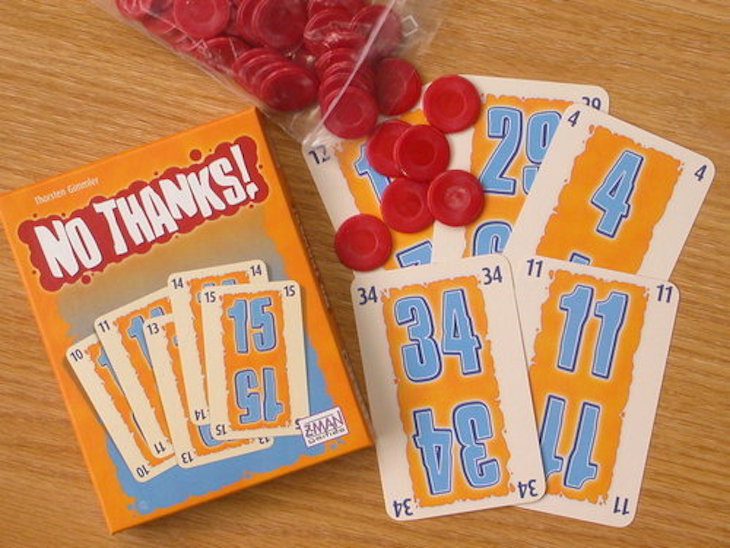
Even though No Thanks has a dead simple ruleset, there’s still quite a few tactical choices to be made. If you’ve already got the 20 do you take the 19 on the first go around to make sure you get it, or do you “send it around” and fish for more chips? Do you pick up the 18 and hope to get the 19 at some point? Decisions are compounded by the fact that any chips at the end of the game count in your favor and reduce your score.
I’ve taught No Thanks to many many people and it’s always a hit. You’ll definitely want to say “Yes please” to No Thanks.
Check out our review of No Thanks.
L.A.M.A.
If you’re a board game fan then you’ve probably heard of the Spiel des Jahres, the highest honor in the world of board gaming. Originally created in 1978 the Spiel des Jahres (along with the sister awards the Kennerspiel des Jahres, and the Kinderspiel des Jahres) is meant to reward excellence in game design, and promote top-quality games in the German market. In the past 10-15 years the Spiel des Jahres has trended towards lighter and more family oriented games, including nominees and winners like The Mind, Kingdomino, Codenames, and the 2019 nominee L.A.M.A. from Reiner Knizia.
In L.A.M.A., as in No Thanks, players are striving to have the lowest score by playing their cards to a central discard pile. The deck is thin, composed of just 56 cards (numbers 1-6, and 8 “llama” cards). On your turn you can play a card from your hand to the deck if you can play the same number, or one higher, displayed on the top of the discard pile. Llama cards can only be played on top of 6s or other llamas, ones can only be played on top of llamas or other ones, etc..
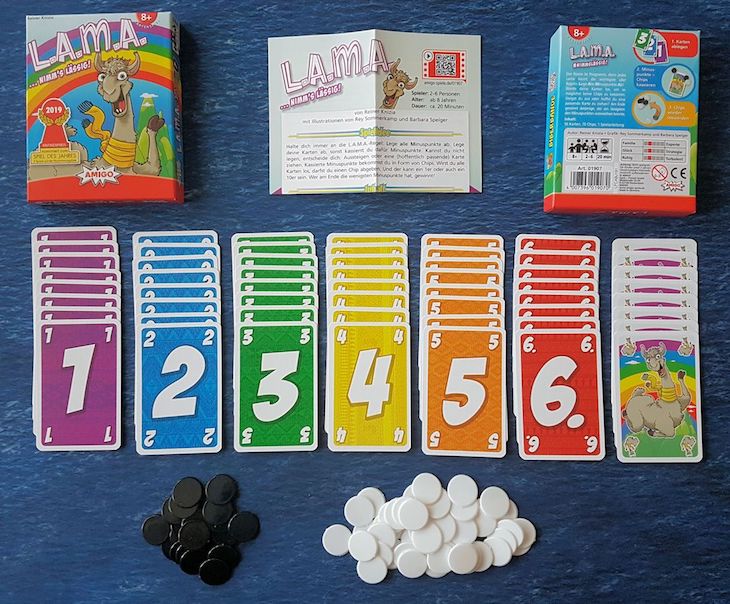
The round ends when either one player discards their last card or everyone has folded. Any cards remaining in your hand count against you at their face value (llama cards are 10 points). However any cards with the same number stack and only count once. Therefore a 1 and three 3s would only total 4 points.
The best thing I can say about L.A.M.A. is that upon introducing it to a friend of mine, a bit of a grump when it comes to new games, he harrumphed “I heard L.A.M.A. sucks; it didn’t deserve the Spiel des Jahres nomination”, but after finishing a game he admitted “that was way better than I thought it would be”. L.A.M.A. is a fun and simple game with some really neat push your luck gameplay. It’s definitely worth picking up. Besides, how many other game designers would be willing to wear a llama costume to an awards ceremony?
Nominiert für das Spiel des Jahres 2019: L.A.M.A. von Reiner Knizia. #sdj2019 pic.twitter.com/gvw0OIX3uV
— Spiel des Jahres (@SpieldesJahres) July 22, 2019
Read our full review of L.A.M.A.
Pearls
Pearls is a fun lightweight set collection game in which players dive to the ocean floor to collect valuable pearls in order to sell them to local jewelers.
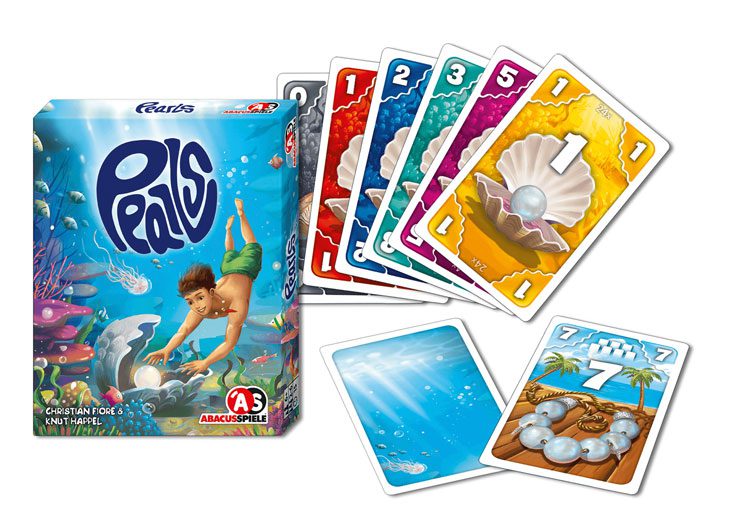
Pearls offers players two choices: collect all pearl cards of a single color from a central display, or play any number of pearl cards of a single color from your hand into your scoring area where they’ll be worth face value at the end of the game. Playing smaller sets allows you to be more flexible and collect points more rapidly, but if you wait for a larger set you may be able to collect a bonus card based on the total number of cards you play. Keep in mind that you’ve got a hand limit of ten cards so your choices aren’t always as straightforward as “pick up the good cards”. If there’s 3 juicy 5s in the display, but you’ve only got room for 2 cards you’ll have to leave them for your opponents.
The rules are simple, the artwork is simple yet beautiful and vibrant, and Pearls is fun to play.
Kariba
Kariba is a delightful and whimsical game about bringing animals together around the watering hole for a little kum-ba-yah…until the big dogs roll in and try to take over.
In Kariba players place as many cards of one type of animal as they wish from their hand to a shared watering hole. If the total number of cards on that numbered exceeds 3 or more then your animal scares away the next smallest animal. You’ll collect the scared-away animals into your scoring pile where they’ll each be worth one point (no matter the number on the card).

Like the other games on this list, Kariba is simple and easy to play. The artwork is composed of simple colorful shapes and the effect is quite pleasing. Kariba comes in a teeny box (smaller than a smartphone in fact) but it’s packed with goodness. Because you have to play at least one card every turn Kariba forces you to make moves you’d rather not, and because the stack “breaks” at 3 animals you always have to be on the lookout for someone who can come along and play on top of the very stack you planned to take. I can’t recommend Kariba highly enough.
Check out our review of Kariba.
Honorable Mention
There’s such a large number of light card games that creating this list was much harder than I expected. The games listed above would be my personal choice to replace UNO, but the rest of our writing team had their own ideas. Here’s a short list of Honorable Mentions that didn’t quite make the cut. If I left your favorite game off the list, let us know in the comments or on social media.
6 Nimmt
6 Nimmt is a simultaneous game in which players compete to have the fewest points at the end of the game. Select a card from your hand and place it on the table. Then each player turns over the card they have selected and places it on one of the 4 existing stacks of cards in numeric order. The catch is that if your card is lower than one of the cards on the table you have to take the stack. Each card has a number of cow icons, or “bull heads” as they’re affectionately called, and at game’s end each symbol counts as a point against you. 6 Nimmt is fun and frustrating, and a blast to play. A round takes just a few minutes which means that you can play 6 Nimmt until the cows come home. 😀
Team Play
As the name indicates this is a team game, one of the only ones on this list in fact. But don’t let that stop you. Team Play is excellent card game in the same vein as Hearts, Bridge, or Canasta. In this game teams attempt to collect sets of cards in their hand to match mission cards laid out on the table. Example mission cards are “1 2 3 4 of any color”, “red 3 of a kind”, or “two cards of add up to 9”. Teammates can pass cards to each other, but can’t otherwise communicate. The goal is to have the highest number of points from mission cards at the end of the game.
Check out our review of Team Play.
The Game
If you’re tired of getting trounced by grandma every time you play a card game together, then The Game just might be the right “game” for you! Whereas every other title on this list is competitive, The Game is cooperative, which means that grandma can be on your team for a change! In The Game players take turns playing cards from their hands to a shared play area consisting of 4 piles: 2 ascending and 2 descending piles. The goal is for all players to empty their hands. The catch is that players can’t speak to determine where, when, and what cards they will play. The cards in the deck are uniquely numbered from 2 to 99 and card placement follows a set of simple rules. The real challenge of The Game is not only actually winning it, but effectively communicating with the other players using the limitations that the game sets forth. And the other challenge, of course, is trying to stop playing. The Game is a fun and relaxing game that you and your family and friends will want to play again and again.










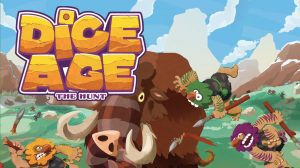






Add Comment